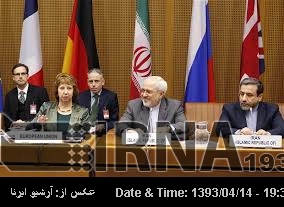ID :
334409
Sun, 07/06/2014 - 08:14
Auther :
Shortlink :
https://oananews.org//node/334409
The shortlink copeid
Vienna Talks: Golden Opportunity For Nuclear Deal

Tehran, July 6, IRNA -- Iran and the five permanent members of the UN Security Council—the United States, Britain France Russia, and China—plus Germany resumed the sixth round of talks over Tehranˈs nuclear energy program in Vienna on Wednesday.
Sunday edition of the English-language newspaper Iran Daily wrote that this is the last chance to arrive at a comprehensive deal before the July 20 deadline set under the terms of an interim accord signed in November. Therefore, the two sides seem determined not to lose such a golden opportunity to resolve the decade-long dispute over Iranˈs nuclear work.
During the last round of talks in Vienna last month, negotiators began to draw up the draft of a final nuclear deal despite a wide range of deep disagreements.
The level of enrichment and the number of centrifuges are among the most sizzling issues on which the two sides disagree. The disagreements were made public by French Foreign Minister Laurent Fabius.
Fabius told France Inter radio on June 10 that Tehran must reduce the number of its centrifuges in order to reach a durable deal.
ˈWe say that there can be a few hundred centrifuges, but the Iranians want thousands, so weˈre not in the same framework,ˈ the French minister said.
The Islamic Republic of Iran seeks to increase the number of its centrifuges, which currently stands at 19,000 in its Natanz and Fordo nuclear facilities, to 50,000 centrifuges and to replace the old ones with cascades of advanced centrifuges, which can significantly speed up the process of enrichment.
But the P5+1 wants Iran to reduce its operating centrifuges to less than 5,000.
During the last round of negotiations, the Associated Press wrote about deep disagreements over the number of centrifuges. Reuters also quoted an unnamed Iranian diplomat that the Iranian side has rejected the idea of cutting down on centrifuges.
In the run-up to sixth round of talks, currently underway in Vienna, Israel expressed concern about reaching a comprehensive deal, saying that the P5+1 has budged on its stance on the number of centrifuges.
Speaking to Sky News, Israeli Prime Minister Benjamin Netanyahu urged the P5+1 not to give in to Iranˈs demands and not to allow the Islamic Republic to maintain the uranium enrichment technology.
Russiaˈs Deputy Foreign Minister Sergei Ryabkov, however, said Iran and six world powers have not come anywhere near an agreement on the number of centrifuges in Iran. ˈThis is an issue that is on the negotiating table right now and we have not come anywhere close to resolving it,ˈ he said.
The two sides entered yet another round of negotiations with some substantive disagreement, the significant of which is the number of centrifuges. Their efforts to settle these disagreements are seen as both sidesˈ determination to resolve the issue of Iran’s nuclear energy program.
Ahead of the new round of talks, American daily USA Today put forward two proposals to solve the rifts over enrichment and the number of centrifuges.
The newspaper wrote under the first proposal, the number of centrifuges decreases and would be increased in case new reactors are built. And based on the second plan, the machines would be upsized in numbers but will be put under tight scrutiny.
Therefore, this disagreement and other ones over the heavy water Arak reactor, inspections of Iranˈs nuclear plants, sanctions imposed on the Islamic Republic seems not to be irresolvable and thus blocking a comprehensive accord.
What might prevent inking a deal before the deadline is time. That could be reason why both sides decided to sit at the negotiating table for nearly 20 consecutive days.
In an article published by the Washington Post, US Secretary of State John Kerry wrote. ˈWe entered into this negotiating process because we believed it had a real chance to succeed. It still does, but time is running short.ˈ
He noted, ˈOur negotiators will be working constantly in Vienna between now and July 20. There may be pressure to put more time on the clock. But no extension is possible unless all sides agree, and the United States and our partners will not consent to an extension merely to drag out negotiations.ˈ
Maybe, in order to grasp this ˈgolden opportunityˈ, the US has decided to send Deputy Secretary of State William Burns to help top American negotiator at the nuclear talks with Iran Wendy Sherman break the gridlock.
Burns met Iranian negotiators twice last month, first in Geneva for bilateral talks and then in Vienna during the fifth round of talks.
After a trilateral meeting with Burns and EU foreign policy chief Catherine Ashton in Vienna on June 16, Iranian Foreign Minister Mohammad Javad Zarif said he only negotiated the nuclear issue with Burns only.
It underlines US President Barack Obama’s order to elevate the level of Americaˈs delegation to preserve the chance to reach a deal with Iran.
Iranian Deputy Foreign Minister Abbas Araqchi told Iranian media the fact that almost the three weeks that had been scheduled for final negotiations was ˈa sign the two sides are serious about driving the talks to a conclusionˈ.
Both sides know that the sixth round of talks is a real golden opportunity to clinch a comprehensive deal and should not be lost./end





